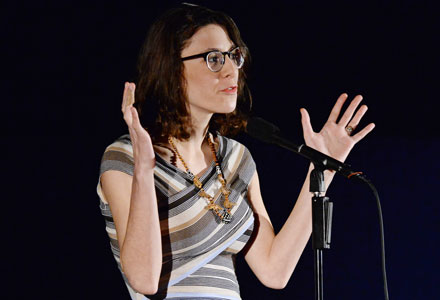#ScienceFail showcases human side of science
#ScienceFail is an event that revolves around oral storytelling with an emphasis on learning how to triumph from failures.
When Vanessa Victoria Volpe, a doctoral student in developmental psychology at Carolina, began her study on children’s perceptions of their race and life successes, the students didn’t feel comfortable answering her questions.
But after she tweaked her interrogatives to emphasize how much she needed the children’s help to benefit others in the years to come, Volpe got the answers and data she needed to finish her research.
Her early failure – recalled during a nine-minute stint on stage recently at UNC’s Morehead Planetarium – ultimately led her to better results than she initially expected. Talking about the experience before an audience, she said, was helpful, which was the moral of the stories told at #ScienceFail.
“The idea that if you fail, you keep it to yourself, is part of the culture of science,” said Volpe, who conducted the study in collaboration with the Blue Ribbon Mentor-Advocate program. “But really sharing it, you realize it’s a common experience.”
Volpe was one of five students from Carolina and Duke University to speak at #ScienceFail, an event that revolves around oral storytelling with an emphasis on learning how to triumph from failures. Clare Fieseler, co-founder of Scientists with Stories and a doctoral degree candidate in ecology at Carolina, came up with the idea for #ScienceFail with a group of fellow students. She also had input from UNC Chancellor Carol L. Folt and support from leaders at the Morehead Planetarium.
The idea was to show the human side of science.
“Our global challenges are inherently science-based,” Fieseler said. “To have this disconnect between scientists and the public, it’s a problem. So if we can bridge that through stories, through our common humanity, I think that’s the first step.”

UNC-Chapel Hill graduate student Vanessa Volpe talks about her research during #ScienceFail at Morehead Planetarium.
On stage, under the lights, and working without notes before a sold-out crowd of nearly 250 people at the Planetarium, each of the scientists shared a story where success proved elusive. Even those who have risen to science’s highest heights missed the mark on many occasions.
“You can see this is a series of failures, which lead to the progression of knowledge, and that’s true in most of science,” Oliver Smithies, Weatherspoon Eminent Distinguished Professor of Medicine at Carolina and 2007 Nobel Laureate told the audience. “I would estimate that of all the experiments that I take part in and do, 95 percent are failures in that sort of sense.”
Jeff Polish, executive director of The Monti, a Durham-based storytelling workshop, co-organized #ScienceFail, and said it’s powerful when people talk about their failures.
“It actually builds and creates this sense of community between people because we’re all scared, we’ve all made mistakes, and we all have something we’re ashamed about. But if we embrace it and we talk about it, it actually makes us feel less isolated,” he said.
The #ScienceFail audience also had a major role in the evening’s festivities, one that went well beyond applauding as the storytellers finished their tales.
“The coolest part about this event is that it’s a science experiment in itself,” Fieseler said. “We are studying the reactions of the audience to see how they respond to hearing science and seeing science in this new way, what it does to them, what it does to their world view, what it does to their personal view. And then quantifying that and publishing that in a peer-reviewed paper.”
Fieseler partnered with UNC’s Melanie Green, an assistant professor of psychology who is a specialist in narrative psychology, to lead this investigation. A peer-reviewed paper is only half the outcome Fieseler and her co-organizers are hoping to gain from #ScienceFail. They also want the storytelling to plant a seed and show that science doesn’t have to be off-limits.
“Science illiteracy is going up within the general public, and that’s really worrisome,” Fieseler said. “We need to be lifelong science learners, even if you don’t have your nose in a chemistry book. My hope is that with this event, we get closer to the goal of engaging people in the lifelong learning process of science by making it relatable. That’s really what it’s about.”
#ScienceFail was made possible by support from the Burroughs Wellcome Fund and the Douglass Hunt Lecture Series. To stream the full stories from this event from, visit www.soundcloud.com/ScientistswithStories.




